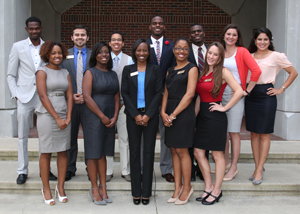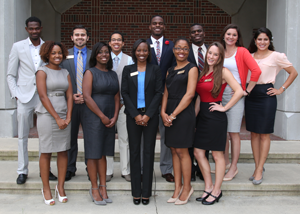Bridge students present their research


May 2014
Five minutes at a time, the dozen Bridge students stood before their mentors at a May 13 luncheon, summarized their master’s research projects and prepared to relax — briefly. Now that they’ve earned the Master of Science in Biomedical Sciences-Bridge to Clinical Medicine, they have reserved seats in the College of Medicine’s Class of 2018, whose first day is May 27.
As always, the annual Bridge Graduation Luncheon was designed partly to show off the students’ research skills but mostly to celebrate this program that provides a bridge into medical school for hand-picked students. They’re good candidates for practicing primary care with underserved or minority patients in rural or inner-city communities — because many come from such communities themselves.
Often, they hadn’t considered medical school until someone from the College of Medicine invited them to dream big and work hard. Thesla Anderson, director of college and precollege outreach, noted at the luncheon that nearly half of these 12 students were the first in their family to attend college, and two-thirds arrived through the school’s pipeline programs.
Though their background may be out of the ordinary, their performance is outstanding. Lynn Romrell, associate dean for medical education, reported that the Bridge students’ graduation rate is exactly the same as the other students’. And as a group, he said, they play a huge role in fulfilling our mission of producing physicians to provide primary care in the communities that need it most.
Dean John Fogarty said he appreciated that their research projects fit the med school’s mission: patient-focused and community-based.
“You’re engaging the community to help you,” he said. “Too often we take on this ‘M.D.-ity’ and try to do it all ourselves.”
Associate Dean Helen Livingston started off the event with praise for two Bridge stalwarts who might not be at next year’s luncheon. Program associate Kit Clayton, known to the Bridge students as “Mama K,” symbolizes the nurturing they get right from the start. She’s retiring, so the students gave her a one-of-a-kind present: a blanket decorated with a giant photo of them.
Also honored was Myra Hurt, the college’s first interim dean, largely credited with its unique structure and its success. Hurt is stepping down as senior associate dean, so Livingston gave her a vase inscribed with words acknowledging her major role in conceiving the Bridge program. “It’s easy to have an idea,” an emotional Hurt said in response, “but it takes great people to make it happen.”
To fill up that vase, each student stepped forward after her or his presentation, pulled a flower from a bouquet and then presented it to Hurt.
Among the guests at the luncheon was Tom Glennon, senior vice president for community development at Capital Health Plan. Last year CHP made a generous donation for scholarships and for supporting the program — including sponsoring the graduation luncheon. CHP has pledged another donation for this year.
Here are the Class of 2014 Bridge students’ names, project titles and faculty advisors:
- Abigail Adair, “Treatment Engagement for Perinatal Depression” (Heather Flynn, Ph.D.)
- Angel Augustin, “Determining Outcomes of Church-based Breast Cancer Prevention: Congregants’ Participation in Health Activities at Follow-up” (Penny Ralston, Ph.D.)
- Etzer Augustin, “Investigating Causes of Dizziness, Imbalance, and Associated Comorbidities in Patients Referred to a Specialty Balance Disorder Clinic” (Gerry Maitland, M.D.)
- Keirsten Dawson, “African American Women’s Perception of Black Infant Mortality: Leon and Gadsden County” (Jo Brown, M.D.)
- Raiza Exantus, “Using Video Education to Assess Information Retention on Type II Diabetes” (Kendall Campbell, M.D.)
- Marckenley Isaac, “Faith-based, Cognitive-Behavioral Intervention for Caregiver Depression: Qualitative Analysis of Training Needs of Lay Pastoral Care Volunteers” (Robert Glueckauf, Ph.D.)
- Erika Nafi-Valencia, “Faith-based, Cognitive-Behavioral Intervention for Depression in African-American Dementia Caregivers: Focus Group Analysis” (Robert Glueckauf, Ph.D.)
- Mauricio Parra-Ferro, “Medication Use Among Residents of a Residential Memory Care Unit” (Lisa Granville, M.D.)
- Ashley Plowden, “Health Behavior Patterns and Health Care Practices of African-Americans Participating in the Breast Cancer Education and Wellness Project” (Penny Ralston, Ph.D.)
- Stephanie Poteau, “Exploring Depression in Older Adults: The Impact of Stigma on Individual Experiences” (Angelina Sutin, Ph.D., and Suzanne Baker, M.A.)
- Ludonir Sebastiany, “Effectiveness of Audio Visual Media Used in Diabetes Patient Education with Minorities (Kendall Campbell, M.D.)
- Lauren Stewart, “Uric Acid and Neuropsychiatric Symptoms in Individuals with Cognitive Impairment” (Antonio Terracciano, Ph.D.)

